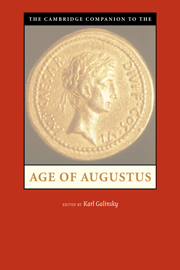Book contents
- Frontmatter
- Introduction
- Part I Political History
- Part II Intellectual and Social Developments
- Part III The Emperor's Impact
- Part IV Art and the City
- Part V Augustan Literature
- 12 Learned Eyes: Poets, Viewers, Image Makers
- 13 Augustan Poetry and Augustanism
- 14 Poets in the New Milieu: Realigning
- 15 Vergil’s Aeneid and Ovid’s Metamorphoses as World Literature
- Part VI Epilogue as Prologue
- Select Bibliography and Works Cited
- Index
13 - Augustan Poetry and Augustanism
from Part V - Augustan Literature
Published online by Cambridge University Press: 28 March 2007
- Frontmatter
- Introduction
- Part I Political History
- Part II Intellectual and Social Developments
- Part III The Emperor's Impact
- Part IV Art and the City
- Part V Augustan Literature
- 12 Learned Eyes: Poets, Viewers, Image Makers
- 13 Augustan Poetry and Augustanism
- 14 Poets in the New Milieu: Realigning
- 15 Vergil’s Aeneid and Ovid’s Metamorphoses as World Literature
- Part VI Epilogue as Prologue
- Select Bibliography and Works Cited
- Index
Summary
Augustus, like Queen Victoria, belongs to that special group of rulers who have given their name to a great period of art and literature. What we are happy to call “Augustan literature” was to be no less epoch-making for the later literature of Rome than Augustus himself proved to be for later Roman history. Such, in fact, was the continuing impact of both on the mind of posterity that it seems quite natural to speak of an “Augustan” period of English literature, too: that from John Dryden, greatest English translator of Virgil, to Alexander Pope and Jonathan Swift, both of whom in their own verse constantly echoed and imitated Virgil and Horace. Pope indeed addressed to King George II, that eminently unpoetical monarch, an “imitation” of Horace's Epistle to Augustus which turned it into a suavely sarcastic poem of feline satire.
There is an element of luck in the universal acceptance of the term. Most of the poets whom we think of as Augustan had grown up and made their name before Caesar's heir reached the position of being, in his own phrase, “by universal consent in complete control of affairs” (per consensum universorum potitus rerum omnium; RG 33). Yet the only great poet actually produced in the reign was the recalcitrant and irritating Ovid, never really on message, who eventually provoked the Princeps, normally ostentatious in his 'clemency' - clementia was one of the virtues commemorated on the shield of virtues voted to him by Senate and People (RG 34) - into banishing him forever to the end of the earth.
- Type
- Chapter
- Information
- The Cambridge Companion to the Age of Augustus , pp. 306 - 320Publisher: Cambridge University PressPrint publication year: 2005
- 2
- Cited by

